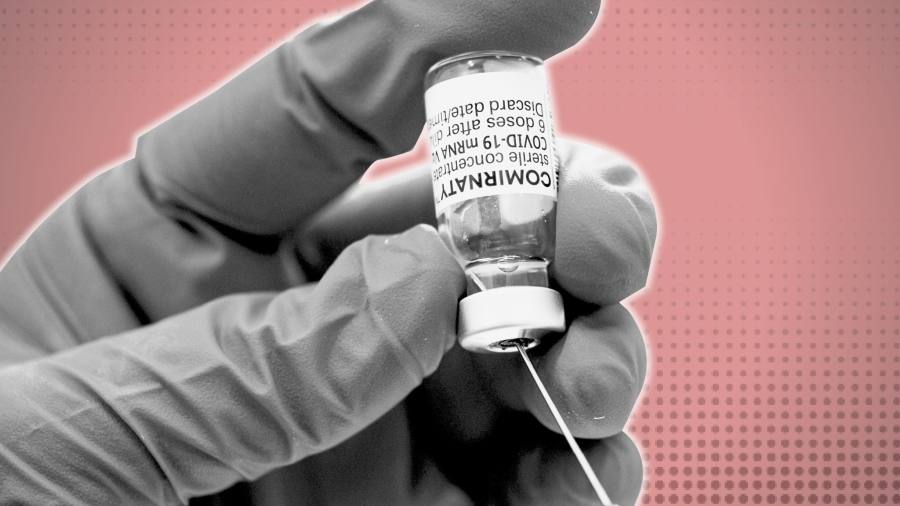[ad_1]
In the race to protect their populations against the Omicron coronavirus variant, countries like the UK and US are rolling out massive recall programs after data showed additional jabs offered better protection against the new strain than two injections.
The latest data – from the University of Oxford – showed on Monday that levels of neutralizing antibodies that attack the virus fell against Omicron, compared to Delta, in people who had taken two doses of the vaccine it took. developed with AstraZeneca, or the BioNTech / Pfizer vaccine.
The substantial drop in antibodies, Oxford said, “suggests that although there is no evidence of an increased potential to cause serious illness or death, an increase in infections in people previously infected or vaccinated may be. likely”.
With early hospital data suggesting Omicron is more transmissible than the dominant Delta variant, boosters appear to be more beneficial than ever.
How do boosters work?
The Covid-19 booster vaccines familiarize the body’s immune system with the spike protein – the exposed part of the virus that binds to human cells. They allow the immune system to better recognize and respond to the real virus if it strikes.
The boosters increase the levels of antibodies and T cells, which boost the immune system’s response to the virus, according to Charles Bangham, professor of immunology at Imperial College London.
“The purpose of the booster is to increase the strength of the antibody and the immunity of the T cells, so that if you are re-infected it becomes a common infection: you are less sick and you are less likely to pass it on. to others, â€he said.
Teresa Lambe, an Oxford professor who helped create the university’s Covid-19 vaccine and co-author of Monday’s study, said a third dose helps “solidify or boost the immune response of Memory “.
“It means you’re in a better position for your immune response to kick in when you see the virus, so you’re better protected,†she said.
Why are they much better at protecting against Omicron than two doses?
The current Covid-19 vaccines were designed to combat the original strain of Sars-Cov-2, which first appeared in the Chinese city of Wuhan. But a third dose boosts the immune system so significantly that it creates a much better army of antibodies to invade the virus – even if it has mutated considerably.
The booster causes an “explosion of action” that is much faster and larger than the initial doses, said Peter English, an expert who worked for Public Health England.
“Larger amounts of antibodies in the blood can still somewhat neutralize the different variants,” he said.

Early data from a lab test shows that a third dose of Pfizer vaccine resulted in a 25-fold increase in neutralizing antibodies that attack the virus against Omicron, a similar level of protection provided by two doses against the Wuhan strain.
And UK Health Security Agency data from ‘real’ cases of Covid-19 caused by Omicron suggests boosters donated in the UK – Pfizer and Moderna – have beefed up protection to make them 70-75% effective against the variant.
How long does it take for the protection to activate?
UK Health Safety data measured effectiveness two weeks after the booster, and data from Pfizer’s trials – which were collected before Omicron emerged – showed antibody levels, which are fighting the virus, soared seven days after the administration of a third jab.
But questionable additional protection can come even sooner than that. English said boosters for the virus that causes pertussis had an impact within 48 hours. “I don’t see why Covid-19 would be so different. The callback response. . . can kick in very, very quickly and produce antibodies very quickly, â€he said.
Are variant specific boosters in development?
Vaccine makers are already fine-tuning their designs to prepare injections suitable for the Omicron variant. Pfizer said it may have an Omicron booster available by March, as mRNA technology can be used to quickly produce a variant-specific vaccine.
But its availability largely depends on the length of a trial. Regulators are likely to demand another trial that would take at least two months.
Penny Ward, visiting professor of pharmaceutical medicine at King’s College London, said the decision to change would depend on how well current boosters protect people from serious illness and death, and the antibody levels of those vaccinated with a modified vaccine.
“If they show that giving a boost with the modified variant is much better than the booster, it would imply higher clinical efficacy,” she said.
Airfinity, the health analysis company, predicts that, at best, only 6 billion doses of a targeted Omicron vaccine would be available by October 2022. If vaccine makers only changed half of production, this target would be reached in January 2023. at the earliest.
Will we need to boost forever?
A scientific consensus has not yet emerged as to whether Covid boosters will be needed each year, as is the case with the rapidly evolving influenza virus. But while the virus is so widespread, it has more possibilities to mutate, creating variants that could make vaccines less effective.
Kingston Mills, professor of experimental immunology at Trinity College Dublin, has predicted that booster injections will be needed “indefinitely,” pointing out how dramatically Omicron has mutated.
“Much depends on how quickly we control the Sars-Cov-2 virus around the world,†he said. “If it is mutating in under-vaccinated parts of Africa, we are at the mercy of one of these mutations.”
[ad_2]

